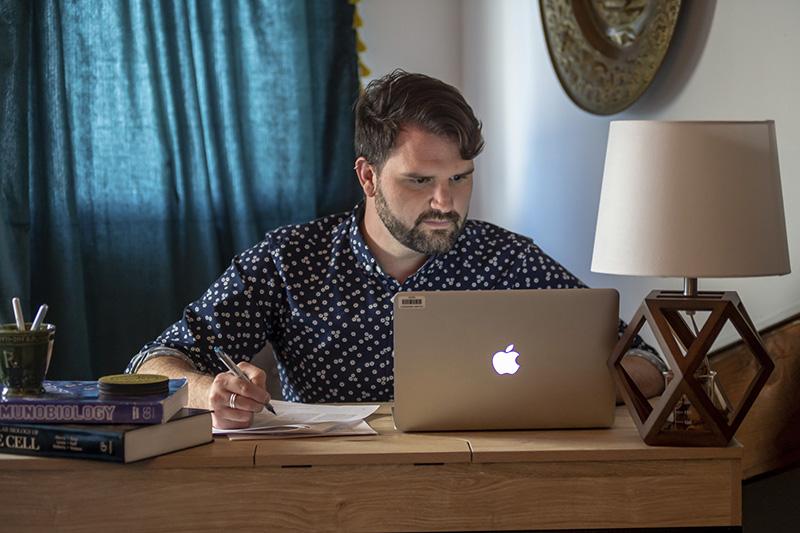Going viral: Tulane staffer shifts roles into COVID-19 science whisperer
As researchers at Tulane and worldwide race to unravel the mysteries of COVID-19, one Tulane employee is studying the studies.
Claiborne “Clay” Christian, a business development officer in the Office of Research Business Development, is the force behind The Tulane COVID-19 Daily Digest, a Tulane University School of Medicine effort to analyze the fast-paced onslaught of coronavirus discoveries so that researchers have more time to spend on their efforts to stop the pandemic. In the newsletter, Christian — who also earned a PhD in biomedical sciences from Tulane — writes a summary of selected studies and research news related to COVID-19 and presents them in a format that is accessible to both scientists and the general public.
“The speed of research and development around [COVID-19] is absolutely eyeball-popping.”
Clay Christian
Using his biomedical background to distinguish important news, Christian not only focuses on the most relevant studies scientists want to know about, he also explains in easily understandable terms why the research matters and how it relates to other discoveries. If research is widely misinterpreted by the public or in medical news coverage, his clear-eyed, evidence-based analysis tamps down any hype and misinformation.
Christian loves being immersed in the science, evaluating the research and then translating it for a broad variety of audiences.
"I know it may not seem like it, but the speed of research and development around this disease is absolutely eyeball-popping. Remember, this virus, SARS-COV-2, was just identified in December,” Christian said. “Scientists spend their entire professional lives getting through one step of a long and complex process that we are now measuring on a time scale of months. It’s honestly a testament to what the biomedical research enterprise is really capable of, from basic research to the clinic, from university research to pharma."
Christian spends his days combing through medical and science journals and major preprint servers to read just-released drafts of scholarly papers and data associated with research. It’s usually unheard of for preprints — scholarly articles that are not yet peer-reviewed — to attract attention beyond the research community, but in these unprecedented times unreviewed data is spilling out into the mainstream in real time. When it comes to COVID-19 science, Christian is there with analysis and context.
James Zanewicz, Tulane’s chief business officer and a Tulane Law School graduate, said that as the university began to address the COVID-19 spread, he and Christian expanded their existing roles to include crisis communications. The newsletter was Zanewicz’s idea, because he recognized Christian’s unique talent to translate heavy scientific material for a general audience.
The newsletter was originally intended for Tulane administrators and faculty members, but word of mouth spread quickly in the broader scientific community. In less than two months, the digest has amassed over 2,000 subscribers, most of whom are outside of Tulane and work in the pharmaceutical and biomedical technology fields. The newsletters generate reader feedback, which has been quite positive.
“What sets it apart is the research focus, the fact that we do the curation and summary, and that we synthesize the information to provide context,” Christian said. “The process is interesting, too, in that we are able to handle this volume of information and distill it so succinctly without sacrificing accuracy, day after day.”
As a business development officer, Christian champions collaborative opportunities between Tulane researchers and biotechnology and pharmaceutical companies and looks for ways for the university to work with those companies.
Of his new role, he said, “I feel fortunate that I am able to help contribute in this small way. It’s rare to get the opportunity to combine a liberal arts background with a broader scientific perspective and have such a far-reaching and immediate impact. Many times when you get a PhD, you end up focusing on advancing one narrow scientific area for your entire career.”
“I’ve joked with Clay that he is our No. 7 – or Taysom Hill,” Zanewicz added, referencing the New Orleans Saints football player. “If we need it, he finds a way to get it done.”

